The first thing to know about book reviews is that "book review" can refer to a kind of magazine called a "book review," like the New York Review of Books or the London Review of Books or the New York Times Book Review, which is a magazine that consists nearly entirely of reviews of book, i.e. short critical assessments of books. These short crtitical assessments can themselves be called "book reviews." You can find these short essays in many places, in newspapers (like the Chicago Tribune, the New York Times, Los Angeles Times, etc. and in magazines, as, for example, Harpers, Newsweek, Time, Atlantic Monthly, the New Yorker, Vogue, Elle, the Nation, the New Republic, the National Review, First Things, the Chirstian Century, American Conservative, Scientific American, Nature, and on and on. Scholarly journals, as, for example, the Review of Contemporary Fiction, Renaissance Quarterly, Journal of American Historical Society, etc. also regularly review books. Finally you can find book reviews online at amazon.com and Barnes and Noble and on various literary blogs of one kind or another. In short reviews of every sort of book can be found in every sort of publication.
And yet.. relatively speaking, there aren't many book reviews. Of the tens of thousands of books published each year, the vast majority are never reviewed. The few that are reviewed often are only reviewed once and then only in highly specialized journals and magazines that have a small number of readers. I would guess less than a thousand books a year that are reviewed by more than one journal and only a few hundred are reviewed in places that might bring them the before a large reading public.
|
| |
| For this reason reviews are enormously important to the books that receive them. They represent one of the only chances a book has to get the public's attention. They are also useful for the reading public in that they represent a way to quickly determine what's worth reading next; for introducing new authors and reintroducing old ones. |
| |
| Tips for locating book reviews: |
| Knowing the author's name is useful--not always necessary, but always useful. Books often have similar titles or exactly the same title. There is no copyright for titles. If you don't know the author, you can usually find this information out by using amazon.com, Books in Print or World Cat. |
| |
| It also helps knowing the book was first published. Again, Books in Print, World Cat or amazon.com will be helpful. The trouble is, if a book has been published more than once you will likely come across multiple records. In that case, you need to find the earliest record. |
| |
| Weekly Newspaper Based Book Reviews |
| |
| The TLS, the New York Times Book Review, and Washington Post Book World |
| |
| In the English speaking world there are a small number of important weekly and monthly periodicals devoted to reviewing books: Times Literary Supplement or the TLS, which is published weekly by the Times of London. The TLS is the greatest weekly book review in English. It is smart; well written; and reviews a wide range of books. Unfortunately, getting access to the TLS is not easy unless you have a subscription--in which case it is very easy. It arrives in the mail or you can access it online. After the TLS, the most important weekly book review is probably the New York Times Book Review or NYTBR. |
| |
| Accessing the New York Times Book Review |
| |
| There are a couple of ways to do this. One way, is to register online with the New York Times. This takes a few minutes, but it is free and provides access to all reviews published in the paper since 1996. Below is an image of the May 23, 2005 online version of the NYTBR. |
| |
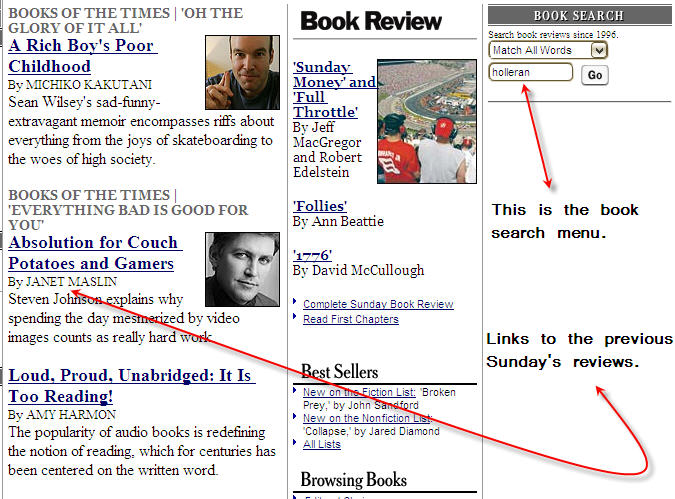 |
| |
| You can also get New York Times book reviews from Lexis Nexis Academic, a database WIU subscribes to. |
| |
| Link path: WIU Libraries homepage, Select A Database, Lexis Nexis Academic |
| |
After you click on the Lexis Nexis Academic link, you are taken to a default screen called Quick News Search. Click on the grayed-out tab, "Guided News Search."  |
| |
| Next, you need to select the appropriate settings. |
- News Category = General
- News Source = Major Papers
- (Skip for the moment)
- All available dates
- New York Times
|
| |
| Your menu should look as below. |
| |
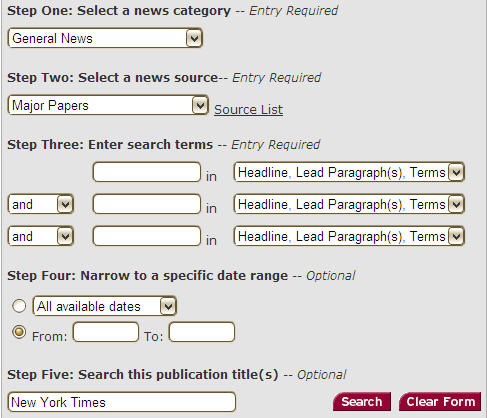 |
| |
| Let's go back to Step 3. The New York Times divides itself into departments--like any other large organization. The New York Times likes to call these departments "desks." For example, the Sunday New York Times Magazine is known as the "magazine desk." Likewise, the book review is called the "book review desk." Therefore, if we want to pull up book reviews, and only book reviews, then we want to search the "book review desk" at the New York Times. To do that set up Step 3 as below: |
| |
 |
| |
| Why is "book review desk" set to "full text?" Because, the phrase, "book review desk" does not belong to any recognized menu option other than "full text." In other words, the database cannot "see" "book review" desk in any other field other than "full text." This being the case, the only way the database can find "book review desk" is to search the full text. |
| |
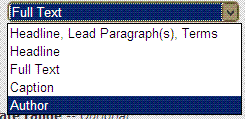 |
| |
| Let's imagine we want to find a review of the recently published (May 2005) book, Sunday Money, in the New York Times Book Review. We could construct a search as below. |
| |
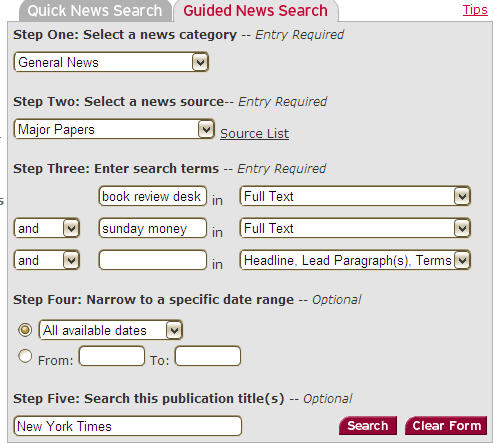 |
| |
| That's pretty easy--as long as you have the search set up correctly. |
| |
| If you want to find reviews of all the books in a particular issue of the New York Times Book Review, then set Step 4 (the date) to a particular Sunday. For instance, May 22, 2005. Your search term would simply be "book review desk." Why? Every NYTBR review has "book review desk" on its record. See the search below. |
| |
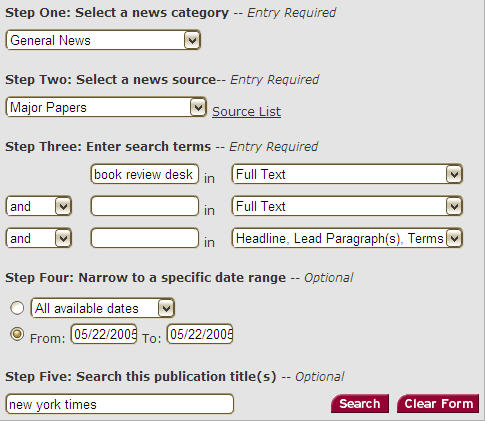 |
| |
The Washington Post, another distinguished newspaper, has a well known book review section called, Book World. You can access it online (you will need to register to read it); or you can search for reviews in Lexis. Below is an example of a Lexis search that pulls up all the reviews in the Sunday, May 22, 2005 issue of the Washington Post's Book World. Note that you must put Washington Post into the Search This Publication Title (step 5) area. Note, too, that you must set "book world" to full text in step 3.
|
| |
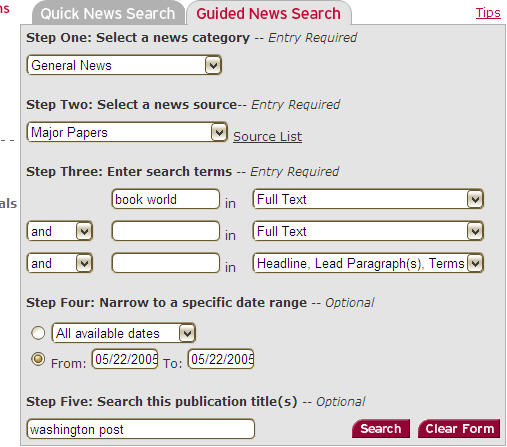 |
| |
| |
| Dealing with the "best sellers" issue in Lexis |
| |
| If you are looking for the review of a book that happens to be a best selling title, you will be confronted with the "best sellers" list problem. Most large newspapers have best sellers lists. That's fine but--it also means that the same book titles appear every week for quite a while on best sellers lists. These lists are also frequently indexed by the databases as "reviews" even though they are not reviews but lists. When you look for a review of say, Nicholas Sparks' novel The Notebook, if you do not exclude the word "bestsellers" you will get a great many lists of bestellers along with your reviews. For example, if you will set up and run the search below you will see what we mean. |
| |
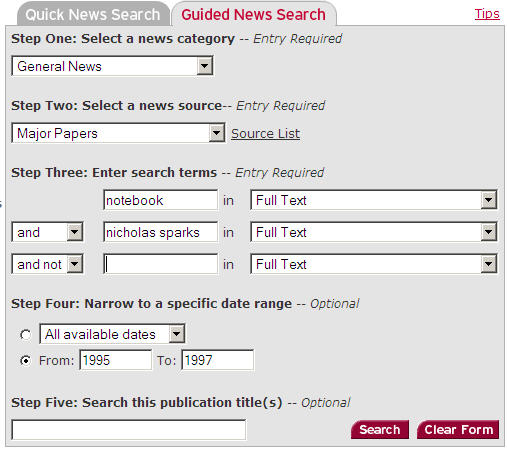 |
| |
| The search below does exclude "bestellers" and "best-selling" by using the "and not" search function and the phrase (bestsellers or best sellers or best-selling). Note that "or" must be used to exclude both "best sellers" and "best-selling" and "bestsellers." Also, and just as crucially, you must place parentheses around those three terms. If you don't the database will give you bad information. |
| |
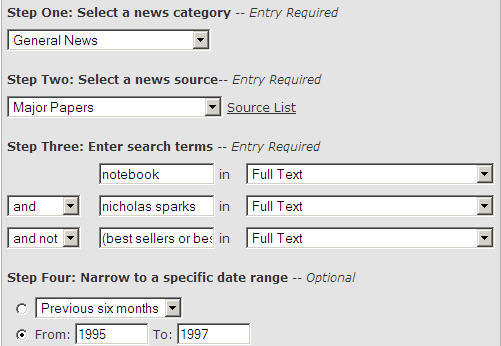 |
| |
| Locating Book Reviews in InfoTrac. |
| |
| Linkpath: WIU Librarie; Select A Database; InfoTrac |
| |
| InfoTrac is a popular and easy-to-use database containing millions of articles and tens of thousands of book reviews. |
| |
| When you first click on the InfoTrac link, you are taken to a default subject search. To find book reviews, however, we want to click on the advanced search link in the blue box on the left hand side of the page. |
| |
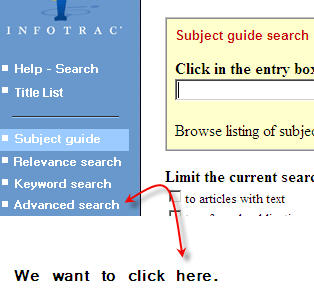 |
| |
| Next, set your search up. The first time out, include the term "book review" as below. This is because many magazines will include "book review" as a heading and InfoTrack will pick this up. |
| |
 |
| |
| Next run a search that is similar to this one, but use the truncation search book* This is because many magazines simply use the heading "books" when referring to book reviews. |
| |
 |
| |
| Finally, run a search that simply uses the term "review*." It is also not uncommon for magazines to simply tag their book reviews as "review" or "reviews." The problem here is, you will end up getting film reviews if the book was also made into a film--unless you were careful to set the search up using publication date. |
| |
 |
| |
| You can also set InfoTrack to a text only default if you do not want to deal with inter library loan. The "text only" delimiter (a checkbox) is located beneath the main search menu. |
| |
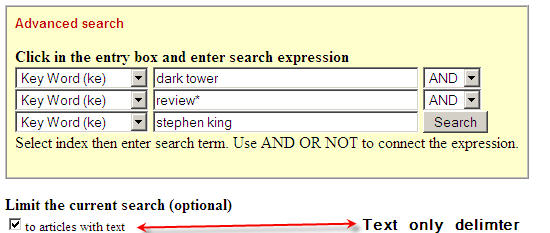 |
| |
| |
| Locating Book Reviews Using Academic Search Elite |
| |
| Linkpath: WIU Libraries; Select A Database; Academic Search Elite |
| |
| Academic Search Elite, another very large, general purpose database, works pretty much like InfoTrac for finding book reviews. The main difference is setting the phrase books reviews to Subject Terms, as below. Note that the "best sellers" issue returns. Unfortunately, Academic Search Elite will not let us exclude multiple terms (bestsellers or best-selling or best sellers) the way Lexis did. So, I excluded "best sellers" as a stab at getting rid of some of the lists. |
| |
 |
| |
| |
| Locating Reviews in JSTOR |
| |
| Linkpath: WIU Libraries; Select a Database; JSTOR |
| |
| JSTOR stands for "Journal Storage" and is a database/archive that specializes in back issues of scholarly journals. This means that most of the articles in JSTOR are at least five years old. So, we wouldn't use JSTOR to look for reviews of current books. We will discuss the distinction between "scholarly journals" and "non-scholarly" ones in a future session. Essentially, scholarly journals are used by academics and professionals (university researchers, scientists, lawyers, doctors). This drives the way the journals select and format their content. Many of these journals have book reviews. |
| |
On the JSTOR homepage, click on the search icon.  |
| |
| You will be taken to a default basic search page. Click on the advanced search link. |
| |
 |
| |
| The advanced search menu is divided into three parts. The second of these parts is named Narrow Your Search. Scroll down to this section, which is itself divided into three parts. The second is These Types. This area allows you to search by the type of article you want, for instance, by book review. Select book review as below. Now the database is restricted to searching only for book reviews. |
| |
 |
| |
| Next, scroll back up to the search box. Let us imagine that we wanted to find reviews of
Alfred Thayer Mahan: The Man and His Letters. Note that I did not include the colon (:) in the search. Why? Well, JSTOR hates colons and will send you an error message if you include in a search. I learned this the hard way. |
| |
 |
| |
| Below is an image of one of the results. If you clicked on the blue Review link, a pdf file containing the review would appear. Because it is a PDF file, you would want to be connected to a fairly fast internet connection. Otherwise, you may be waiting a while for the file to download. |
| |
 |
| |
| Locating Book Reviews via amazon.com or barnesandnoble.com |
| |
| Amazon.com and Barnes and Noble both provide reviews of the books they sell. The reviews are located approximately midway beneath the author/title information. |
| |
| Here is an amazon,com record for David Boies book, Courting Justice. Note that there are professional reviews and, then, further down the page amateur reviews. I find that the amateur reviews are often more helpful than the professional ones. Here is the Barnes & Noble record for the same book. There are no customer reviews attached--possibly because amazon.com is more popular with online book buyers. |
| |
| Book Blogs |
| |
| There are a number of blogs dedicated to books. These blogs discuss and review books, often in a very personal way. If you click here, you will get a list of book blogs compiled by Maude Newton, who has her own book blog. To get a feel for what some of the blogs are like, look at this one by BookGirl. A different sort of blog that is popular with people who like to keep up with books in particular and cultural matters in general is Arts and Letters Daily. |
| |
| |
| End of Lesson |
| |

















